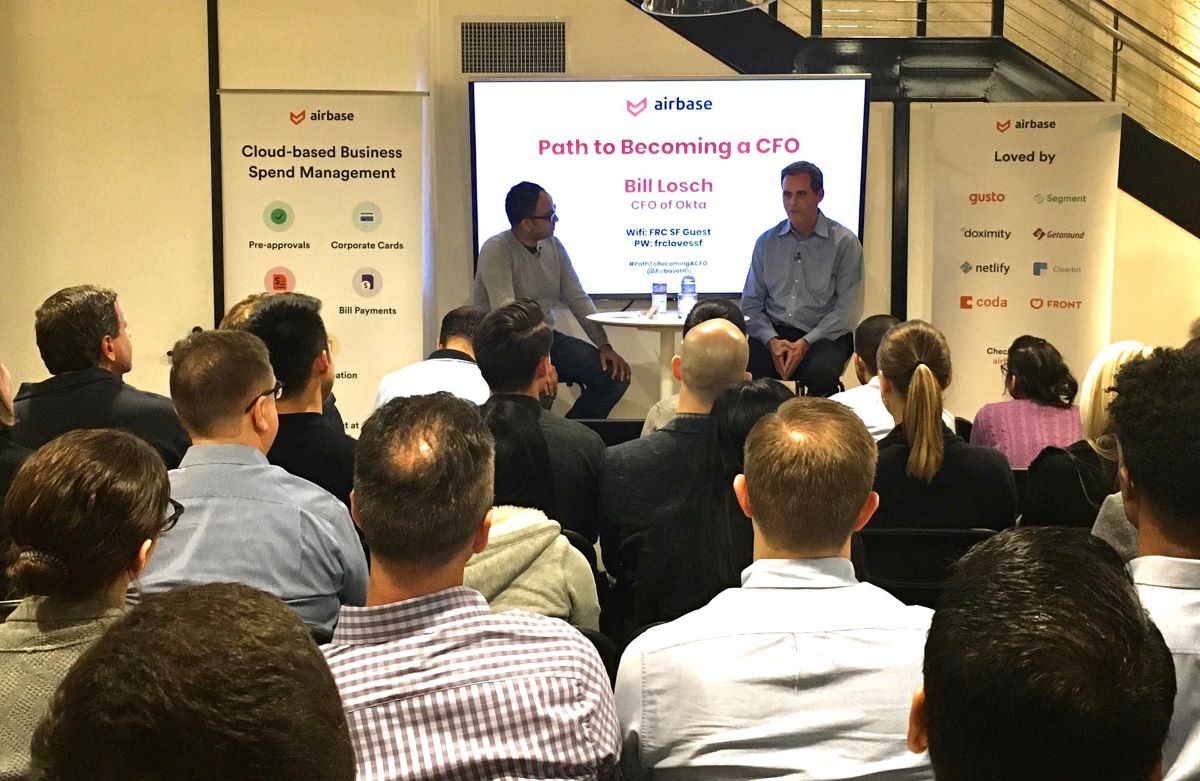Airbase & Its Bold Moves to Puzzle Out The Math of How Companies Should Spend Money
Founded in 2017 and is headquartered in San Francisco, California, Airbase is an all-in-one spend management platform designed to deliver more control, visibility, and automation to today’s finance teams. It helps companies to combine spend approvals with virtual cards, physical cards, invoice management and check payments into a single platform. This gives finance teams full control and visibility into expenses, and the ability to automate the reconciliation process.
An Attempt to Solve Financial Regulation
Thejo Kote, the founder and CEO of Airbase was originally from India. He came to US to pursue his passion for doing something of his own in terms of entrepreneurship and Airbase was his second company. Essentially, Airbase was trying to solve the problem that he learned about building his first company Automatic, a venture-funded startup which was acquired by SiriusXM: that was around how companies spend money.
If we look at all of the money that companies spent, usually it is people’s salaries, and then everything else – which is non-payroll spending like software, travel or food. It is a very complicated process for, especially small and mid-size companies.
There are many different systems that they have to adopt for managing all the non-payroll spending. Some money is being spent on corporate cards. They are also receiving invoices that have to be processed and paid out via ACH or check or something like that. As a category of product called bill payments products, like bill.com that have to be used, employees are spending money on their own and then coming and reimbursing it.
All this is happening on email and is a very ad hoc process, which is no audit trail. It means that the downstream accounting processes and work that is involved is very manual. They go get data from different systems to record it in NetSuite and QuickBooks and all these other systems.
That is kind of the problem Airbase solve. Instead of having silos for spending money across all of these different systems, Airbase unifies all of it, consolidating all of that experience and the entire life cycle of how money is spent.

The First-Of-Its-Kind Spend Management Platform
In March of 2019, Airbase announced the launch of its modern spend management platform. The groundbreaking platform was designed to solve the unique challenges today’s businesses face as they operate in a subscription economy. Airbase debuted with $7 million in Series A funding in a round led by First Round Capital.
“There has been very little innovation in this space, which has forced companies to settle for disparate, outdated solutions,” said Bill Trenchard, General Partner at First Round Capital and Airbase investor. “Airbase has taken a bold step forward to create an entirely new paradigm. It delivers a real solution to the biggest problems finance teams face as their companies grow.”
The experience with Automatic has inspired Kote vision of fundamentally changing how spend management is done in order for companies to grow more efficiently.
“Identifying exactly how funds are being used is complex when you’re rapidly ramping up operations,” said Kote. “We’re building a platform that makes figuring out where the money is going, and then controlling the flow, incredibly easy. We do it by replacing all the tools that usually sit between a company’s bank account and its accounting software.”
Airbase solves the problems of requests, payments and accounting together in a single integrated platform. This holistic approach lets Airbase offer control, visibility and automation where other spend management tools can’t. Now, finance teams can track and oversee exactly when, where, how, and by whom, money is spent at a fraction of the effort. Offering new levels of control and visibility, Airbase frees up funds for mission-critical investments and enables sustainable, more predictable growth.
Customers have already responded to the new paradigm Airbase brings to market. Even before its public launch, Airbase demonstrated impressive traction, acquiring a number of customers including Gusto, Doximity, Segment, Getaround, Netlify, YourMechanic, and others.
“Airbase has transformed our workflows,” added David Coffman, Controller at Doximity. “It’s nice to have one tool to go to for everything. We get back a lot of time as we don’t have to spend hours researching what we’ve spent.”
4 Reasons for Predicted Ongoing Growth
According to Thejo, Airbase was valued at around $600 million at the time of its latest funding round – making all the right noises. In spite of being currently focused on the US market, a majority of this company product development (75-80 percent) works out of India. It has close to 200 employees in total who are spread across 11 countries.
To achieve those impressive number, Airbase has collected all external and internal advantages. Here are 4 reasons proving why we predict Airbase will continue to expand its footprint.

Reason #1: Software Spending Is Increasingly Decentralized
Whether you call it consumerization of the enterprise, shadow IT, or bottoms-up software, the reality is that more and more software is sold directly to the end-user, rather than through traditional gatekeepers at the C-level and in IT.
Across both modern companies and legacy incumbents, information workers have been empowered to find the software tools they need to solve their business pain points. However, this explosion in bottoms-up, decentralized spending, has created a control, visibility, and budget reconciliation challenge for companies, their finance teams and for functional and business unit leaders.
As more and more purchasing has moved away from centralized, top-down spend (which by definition is easy to budget, control and report on) to a decentralized model, companies are struggling to manage this spend while still supporting the speed at which businesses need to operate today. Airbase has built an elegant software solution that seamlessly allows end users to receive pre-authorization for specific vendor spend while at the same time, automatically reconciles this spend at the end of the month for the budget owners thereby solving this issue.
Reason #2: B2B Payments Moves To Card/ACH/Virtual Cards
For the past few decades, the movement to digital has been a sea-change in commerce. Independent surveys have consistently validated the compounding impact digital technologies have had on payment methods, with precipitous declines in cash and check payments. Moreover, as employees buy small recurring licenses for software and cloud services, more of these types of payments are ending up on corporate and personal cards, rather than formal invoices.
This digital payment movement has created a set of challenges that add up to significant pain for finance leaders. Without flexible controls, corporate cards may either default to declining or accepting payments, leading to under- or overly strict policies. When employees leave their companies, they need to have their cards closed, but this also endangers any critical systems that are tied to those digits. As the number of subscriptions increase, it’s easy to lose track, leading to recurring payments for software that’s no longer in use. In other words, the need for spend management platform like Airbase is increasing.
Reason #3: Airbase Meets the Need of All-In-One Solution
Airbase is solving challenges both strategic and tactical — from making sure that employees don’t leave and cause critical payments to bounce off their (then-deactivated) cards, to codifying and enforcing budgets and approval flows for spending. Rather than purchasing separate tools for billing, accounting, budgeting, and more, Airbase’s unified spend management platform saves everyone time and frustration.
You may have seen Airbase’s billboards and signs around San Francisco, showing how CFOs are smiling from all the time and money that the platform is saving them. Needless to say, these aren’t just ads; in talking to customers during our diligence process, we heard glowing reviews of Airbase’s integrated workflows, time savings — and high praise for the team.

Reason #4: Founder Has Experience From the First Startup
As we mentioned, Airbase is Kote’s second startup. His first one -Automatic – was trying to pioneer the notion of an app ecosystem to enable the concept of the connected car. The business was tough as the market wasn’t quite ready: the OEMs were tough to sell to and moved very slowly, and the app space became increasingly dominated by Apple and Google.
In the face of these challenges, Kote demonstrated incredible perseverance and grit, battling through six tough years of fundraising, deals with major retailers like Apple, Best Buy, and Amazon, and eventually to an acquisition by SiriusXM for $115M. He took the lessons learned from that first startup, and began working on Airbase.
As we got to know the company, spending time with the Airbase product and customers only reinforced to us that Thejo is a world-class product leader. Reviews steadily affirmed that Airbase’s product is best-in-class, and the first to truly re-imagine the workflows associated with spend management and accounts payable in today’s modern world. This feedback was echoed by the dozens of Airbase customers we spoke to, who loved the solution and very much believe in Thejo and the roadmap he’s building.
Spend Support for International Subsidiaries & How Airbase Fights in Market Share
“The demand for that product jumped quite a bit in 2020 because the pandemic really accelerated in terms of where people are hiring, and every company is now hiring employees and vendors remotely all over the world,” Kote said.
In the new normal, as more companies lean into remote work, and a great many startups are founding themselves on multiple continents, the new capability could boost Airbase’s effective total addressable market. Startups competing in the market offer customers corporate cards and a software suite to help them manage spend more generally, along with other functionality that varies based on the provider in question.
Tracking Airbase competitors Ramp and Brex, for example in how they raise capital and look to differentiate their products to better serve their target markets, we realized that they are doing so by both pricing decisions and feature choices. Brex added a paid package of software at an SMB-friendly price point. Ramp is sticking to its zero-cost guns for now.
Airbase, while perhaps less well-known than its rivals, was early to the decision to charge for its software in addition to deriving interchange revenues from its business. Now, with support for international subsidiaries and currencies for U.S.-based companies, Airbase is executing against its vision to provide spend management services for companies from inception through IPO, as Kote said in an interview with TechCrunch.
In more detailed terms, Airbase supports payouts to some 200 countries, as well as support for moving money around more generally in a more constrained geographic area.
The product news fits into Airbase’s goal of supporting companies even as they scale. Other competitors in its market have a greater SMB focus, it appears. Airbase does offer a free tier, but more as a method of attracting customers that could scale into large accounts in time, it explained.

Those larger accounts are the startup’s goal. Kote said during a conversation that his company now has a number of customers paying six figures per year for its software, a change from when the company raised $60 million earlier this year, when such account sizes were rarer.
By adding more capabilities for multinational companies, Airbase may be able to land more large customers, which, in turn, would generate both software and interchange incomes for the startup.
Kote also disclosed new growth metrics for Airbase, though in relative instead of absolute terms. The startup has scaled annual recurring revenue — a metric that calculates annualized subscription software sales at a company — by 3.5x in the last 12 months, he said, and 2x in the last half-year. Kote also disclosed that his company is “approaching” $2 billion in annualized payment volume through its service, up 5x in the last 12 months.
Still, as Airbase looks to support larger companies longer, we’re seeing an interesting divergence between the corporate spend startups battling for North American market share. With three major players charging nothing, a little and a lot, it isn’t hard to guess where each will focus their product efforts in customer terms.
“The larger a company gets, the requirements around workflows become more specific,” Kote said in an interview. “In the last couple of months, we listened to our clients and launched an advanced approval product.”
The Bottom Lines
Airbase’s success is the combination of business savviness to solve manual problem and flexible strategies to differentiate itself in the market. Being still a startup facing much competition, Airbase has long journey to pave. However, how this company realize problems in financial services has given some lessons away for companies.








